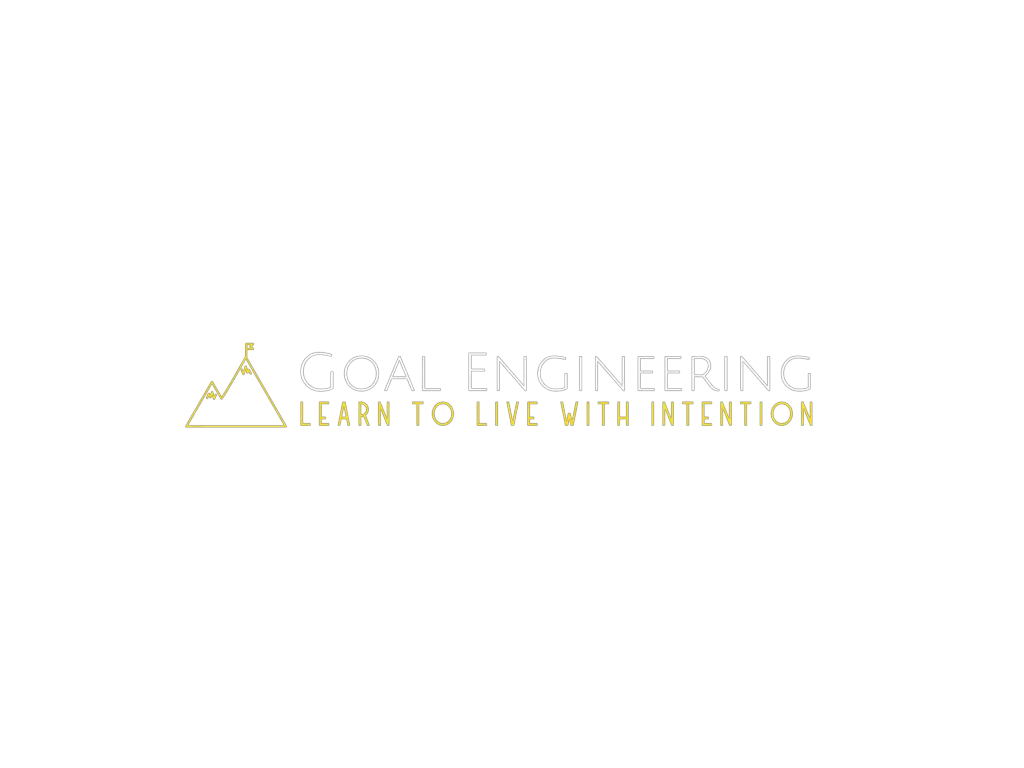You want to change your life. You want to do incredible things, and most of all, you want to become a better person. The best way to do this is to set and achieve big goals, but how do you set the right ones and stay consistent? What you need are a few simple tips for setting goals.
Here are 19 goal setting tips that I’ve used to change my life and that you can use to become your best self too:
- Write Your Goals Down
- Make Your Goals Easy
- Make Your Goals Fun
- Set Goals That Inspire You
- Make Sure They’re What You Actually Want
- Don’t Set SMART Goals
- Create a Lead Indicator
- Create a Lag Indicator
- Set Quarterly Not Yearly Goals
- Plan to Start on a Monday or First of the Month
- Just Begin!
- Have a Growth Mindset
- Track Your Goals
- Review Your Goals Every Week
- Share Your Goals With Others
- Change Your Goals if They’re Not Working
- Take Breaks
- Quit if You Need to
- Have a Vision for a Better Future
How This Guide is Set Up
Tips 1-10 are what you need to do before you start. These can act as a checklist of sorts to make sure that your goals are the right ones.
The second part, which includes tips 11-19, will teach you the steps you need to follow as you start working on your goals to be successful.
Also note that while this list is quite large, you don’t need to worry about making all of your goals all of these things. But if you were to just pick one goal and do all of these things with it, your chances of success with it will significantly increase. And that’s proven by science in many cases, as you’ll see!
I’ve personally used every one of these tips and I know that they will work to change your ability to set the right goals and reach them. These principles have helped me run a marathon, lose 25 pounds in six weeks, double my income, start two companies, change careers, start a family, and much more!
Just imagine how it would feel if you could finally accomplish all those great ambitions you’ve got in your heart. How would your life change if you had the ability to reach any goal you imagined?
With these tips for setting goals, that will finally become a reality!
Section 1: Goal Setting Tips to Follow As You Set Your Goals
1. Write Your Goals Down
“A goal without a plan is just a wish.”
– Antoine de Saint-Exupéry
You’re 42% more likely to accomplish your goals if you write them down. Science confirms this, it was the result of a study done by Dr. Gail Matthews of Dominican University.
Think about everything you’ve ever wanted to do in life. The ones that actually became a reality were almost always written down, right? I’ve been writing my goals down for over 15 years and I know from experience that it works.
I use a spreadsheet to record and track my goals. You can use a journal, Google Doc, or even a 3×5 card. It doesn’t matter what you use, just write your goals down so you can make them happen!
2. Make Your Goals Easy
“The harder you try to be perfect, the less likely you’ll accomplish your goals.”
– Jon Acuff, Finish
You want to be perfect, but you don’t need to. And you’re going to have to kill your inner perfectionism monster if you want to skyrocket your chances of accomplishing any goals at all.
To practice this, try cutting your goals in half. It’ll scare that inner perfectionist right out so you can stab it in the heart!
Think you want to run a marathon? Run a half first. Actually, just try for a 5k before anything else! Trust me, I know what I’m talking about here, I’ve done all of these. If I hadn’t made it easy first, I would never have completed the marathon I always wanted to do.
3. Make Your Goals Fun
“Make it fun if you want it done.”
– Jon Acuff, Finish
Notice that I’ve quoted Acuff’s book Finish twice in a row now? That’s because I’ve read it, tried its advice, and I know that it works! Cutting my goals in half was only the second-best thing he taught me. The best thing was that I should make my goals fun.
How funny is it that you think you have to go on a run to be healthy, and yet you love dancing, but for some reason that doesn’t count as exercise?
This is just one example. But if you look closely you’ll find plenty of areas of your life that you’re trying to make yourself do something you hate just because you think you have to do it. Stop it!
Look for what you love to do whenever you’re setting goals.
For me, one thing I love is video games. So I got Ring Fit Adventure on the Switch and my exercise success rate has doubled in the last six weeks!
Can you imagine having fun and progressing toward a big goal at the same time? It’s not only possible, but picking fun goals makes you more likely to accomplish your end goals!
4. Set Goals That Inspire You
“People are not lazy. They simply have impotent goals—that is, goals that do not inspire them.”
– Tony Robbins
This goes along with setting fun goals, but it’s more about thinking of the future. Fun goals increase the chances you’ll finish. Inspiring goals, on the other hand, light a fire inside of you.
A couple of years ago I was in a pretty bad rut. My career was stagnating and I just felt bored with life. I realized I hadn’t set any big goals, and that’s when I decided I would run a half marathon and go to graduate school.
The inspiration that came from thinking of how I’d feel after accomplishing these goals took me right out of the rut I had been in. Before I knew it I was skyrocketing my way to a whole new level of success and motivation!
If you need some inspiration, here are 16 of the best goals in life to get you started!
5. Make Sure They’re What You Actually Want
“In life, the first thing you must do is decide what you really want. Weigh the costs and the results. Are the results worthy of the costs? Then make up your mind completely and go after your goal with all your might.”
– Alfred A. Montapert
The funny thing about my goal to go to graduate school was that it inspired me, but I later found out that it wasn’t really what I wanted. Which is okay, by the way, and I’ll get to that in goal-setting tip number 11.
Sometimes a goal inspires you only because you think of how others will look at you once you’re done. Prestige is a dangerous thing because it can motivate the heck out of you, but also blind you to what you really want deep down.
Always ask yourself: is this really me? Would I be happy climbing this ladder? Look at the people who are where you are thinking about heading, or who have done it. Do you like the kind of life they live? If the answer is no, don’t be afraid to try something else.
But you also don’t want to sit worrying so much about whether or not a goal is right that you don’t start, which I’ll get to soon. But first, it’s time to debunk a popular myth about goal-setting.
6. Don’t Set SMART Goals
“There are only two rules for being successful. One, figure out exactly what you want to do, and two, do it.”
– Mario Cuomo
You hear all the time that you need to make your goals Specific, Measurable, Attainable, Realistic, and Time-Bound. But honestly, has it ever worked for you? Have you ever really been able to follow the entire process, complicated as it is?
I’ll tell you my shortcut for making your goals SMART without trying in a minute. But first, a few facts about the SMART acronym:
- It’s over 40 years old. The internet wasn’t even around when it began.
- It originally began as a way to help managers set good goals for their teams.
- It’s completely made up, and there are dozens of different versions of it.
- Finally, it’s just way too complicated to work. Remember how I said you need to make your goals easy and fun? SMART isn’t that.
This doesn’t mean that you can just set any goal, it just means you don’t need to overcomplicate it. My goal setting tips seven and eight show you how.
7. Create a Lead Indicator
A Lead Indicator is simply the action steps you’ll take toward your goal. The lead part just means it comes first, or it “leads.” The indicator part refers to how it indicates whether or not you’ll succeed.
If you’re trying to lose weight, for example, your lead indicators might be running 3x per week, going to Yoga class each week, or tracking meals daily. You cannot accomplish the end result of losing weight without doing action steps first.
To find this, ask yourself what things that, if you did, would have the biggest impact on getting you toward the result you want. Which brings us to our next tip, which is creating a Lag Indicator.
8. Create a Lag Indicator
So if Lead Indicators are the efforts you put in toward your goal, Lag Indicators are the final outcome that you’re working toward. This would be something like “I want to lose 10 pounds” for instance.
Sometimes, when setting goals, you start out by writing down a Lag Indicator. But it’s also common to fall into the trap of writing a Lead Indicator instead. Lead Indicators aren’t really goals, but Lag Indicators are.
If you’re thinking you want to just run 3x per week that’s not a goal, it’s a Lead Indicator. Ask yourself “why do I want to do this?” to find the Lag Indicator attached to that goal.
9. Set Quarterly Not Yearly Goals
“Most ‘impossible’ goals can be met simply by breaking them down into bite-size chunks, writing them down, believing them, and then going full speed ahead as if they were routine.”
– Don Lancaster
How many times have your New Year’s resolutions failed? Chances are you get excited about your big goals at the beginning of each year, imagine how it will be so amazing to change, try for a few weeks, and then give up? Why? The reason is you’re setting your sights too high, and too far away.
Instead, set goals on a 12-week cycle, not 12 months. If you want to learn more on how it’s done, check out The 12-Week Year.
I’ve been doing this for over 18 months now and all I can say is that IT WORKS! It’s incredible how much easier it is for me to ride the wave of motivation so much longer just because I’ve broken my bigger goals down into 12-week chunks.
If I’m ever starting to lose steam, the end of a 12-week cycle is usually never far off, so I quickly get inspired to sprint to the finish. If you’re skeptical just try it, what have you got to lose?
10. Plan to Start on a Monday or First of the Month
Research from five different studies shows that you are more likely to stay motivated to finish a goal if you begin on a Monday or the beginning of the month or quarter. The reason is that you tend to think more positively of your current and future self than you do of your past self.
So when you have a significant date that makes you feel as if you’re getting a fresh start, you’re more likely to stick with your goal because you’re thinking more positively about yourself. And because the negative self-image just got wiped clean after this new beginning.
In other words, you’re more positive at the beginning of the quarter, month, or week, and you should take advantage of that!
Don’t use this as an excuse to delay, however. Some people try saying “I’ll try again next year” when they haven’t met their goals by September. But that’s a waste of an entire quarter they could have been growing!
Start your next 12-week cycle of goals next Monday and take advantage of the boost in motivation!
Section 2: Goal Setting Tips to Follow As You Work on Your Goals
11. Just Begin!
“You will never win if you never begin.”
– Helen Rowland
It’s easy to sit there endlessly planning your goals. You get stuck in analysis paralysis and it keeps you from actually putting in the work, and that’s not good. At some point, you need to realize your planning is good enough and just start.
I found it’s easier if you recognize the benefits of beginning. Of course, there’s the obvious benefit that you can’t get anywhere unless you start moving.
But starting also helps because you can’t see what goals are right or set the right lead and lag indicators without moving.
You can spend all day preparing, but think of it like this: you cannot change the direction of a car that’s not moving. Once you start going, though, it’s easy to turn the wheel and head where you want to go.
Your goals are the same way. So just start!
Following this advice took me from working in a job I hated for a company that didn’t care about me to being my own boss, making twice the money, and working with inspiring and friendly people.
12. Have a Growth Mindset
“No matter what your ability is, effort is what ignites that ability and turns it into accomplishment.”
– Carol S. Dweck
For the longest time people thought that once you hit a certain age, your brain couldn’t change. Now, we’re learning that this is a gross misunderstanding of how changeable and improvable our brains are.
If you want the full details of the research, read Mindset by Carol Dweck. It’s in the top three books that have changed my life the most. And I’m certain it’s going to completely alter your world for the better.
In summary, society and your upbringing make you think you have a fixed mindset. This makes you believe, mistakenly, that you cannot improve your intelligence, focus, willpower, or anything else about your mind.
The truth, however, is that you can change your mind and anything that you want to about yourself. All you need to do is recognize that it’s true and remember that as you work toward your goals.
Research confirms that if you adopt a growth mindset you will take on more ambitious goals, have more motivation and better brain development, be more productive, and have less mental illness.
13. Track Your Goals
This quote from an article from Science Daily summarizes why tracking your goals is so important:
“If you are trying to achieve a goal, the more often that you monitor your progress, the greater the likelihood that you will succeed, according to research published by the American Psychological Association. Your chances of success are even more likely if you report your progress publicly or physically record it.”
So you know you need to, the only question now is how?
Find out what you enjoy using the most between the following options:
- Spreadsheet
- Physical journal
- Typed/digital journal
- Goal tracker app
It might take trial and error to figure out what you like best, but that effort is worth it to get the rewards. If most people don’t achieve their goals simply because they don’t track them, how much more extraordinary will you become if you figure out the tracking system that’s perfect for you?
When I was a missionary we tracked goals every day using little daily planners. Today, I love using spreadsheets for just about everything, so I created my own daily tracker based off of what I used as a missionary.
That was almost two years ago now and I’m happier, healthier, closer to my family, and I make more money all because I started tracking my goals!
If you want to get a copy of my spreadsheet for free, click here.
14. Review Your Goals Every Week
“Often we are so busy with sawing that we forget to sharpen the saw.”
– Stephen Covey
I’ve been reviewing my goals every week for the last 24 months and it’s completely changed my ability to succeed. Among other things, it helps me:
- Stay productive more consistently because I know that I’ll be accounting to myself at the end of the week.
- Tells me whether or not I need to adjust my goals to be more ambitious if they’re too easy, or to make them easier if I’m not accomplishing them. This keeps me from getting bored from goals that are too simple, and burnt out from goals that are too difficult.
- See how external factors affected my performance and whether or not that means I need to be easier or harder on myself.
Tracking your goals means writing down whether or not you’ve accomplished what you set out to do. This should happen every day.
Reviewing your goals means analyzing how you feel about your performance and whether or not you should continue with the same goals the next week.
To review your goals, ask these questions to begin:
- What wins did I have last week?
- Is there anything I’d like to improve on?
- Do I like these goals?
- Do I need to start any new goals or update, stop, or continue any of my existing ones?
- Did I overperform? Do I need to set a higher goal in this area?
- Did I underperform? Do I need to take a break or did external circumstances affect my ability to perform?
You can use these questions if you like or come up with your own. It might seem simple, but this little thing will make a gigantic impact on your success.
15. Share Your Goals With Others
“When performance is measured, performance improves. When performance is measured and reported back, the rate of improvement accelerates.”
– Pearson’s Law
How would you like to become 76% more likely to accomplish your goals?
This is the result participants in a study had from both writing a weekly progress report and sending it to an accountability partner.
In other words, if you tell your goals to others and share your progress with them, you nearly double your chances of success!
Having an accountability partner can be expensive, but it doesn’t have to be. Although I do pay for a coach myself, I’m in multiple mastermind groups, all of which are free.
In addition, I account to my wife each week on how I’m doing and get her feedback too.
You don’t have to go far to find someone to help you account for your goals. And you should prioritize doing this because the rewards are too great to pass up!
16. Change Your Goals if They’re Not Working
“It does not matter how slowly you go so long as you do not stop.”
– Confucius
Nothing’s worse than accomplishing a goal and realizing that you’re not happy having done so. You might get into a career that you hate, fall into a relationship that’s toxic, or make your health worse instead of better.
But you’re so afraid of quitting and unwilling to admit that you set the wrong goal, that it’s hard to change.
Having the wrong goals can mean that either your lead indicator (action steps) or lag indicator (desired result) aren’t right.
If you still want to reach the outcome you’re hoping for, just change the action steps! Say your new healthy eating habits aren’t making you lose weight. Change your effort to exercising more to see if that makes the difference you want.
For the times that you find that you’re accomplishing your desired result but it’s not what you wanted, don’t be afraid to change it! There’s nothing wrong with changing your career, switching jobs, or whatever it is you need to adjust.
17. Take Breaks
“Let’s loosen up some time and take a break to re-calibrate our life. We need no endless over-thinking, though. Let’s just connect the dots, set the scene, and steam ahead.”
– Erik Pevernagie
According to the law of diminishing returns, the longer you work at something, the worse results you get. Think about it and you’ll realize just how much more you get done in the morning than in the afternoon, for instance.
What’s worse is that the longer you work the more prone you are to mistakes. Having to redo work that’s wrong can mean doing twice the work or more, which is the same thing as cutting your productivity in half.
It gets worse with the more hours you work, but you can halt the dip in productivity by stepping away for a moment.
My favorite way of doing this is by walking outside. I try to do it every hour or half an hour. I’ll go outside as often as possible because science proves that being in nature refreshes your mind.
I also take longer breaks at the end of each 12-week cycle and at the end of the year. It might seem like you’re getting less done by taking that time out to relax, but would you rather have five productive hours of work or an eight-hour day where you’re making so many mistakes and so distracted that you only get three or four useful hours in?
18. Quit if You Need To
“Winners quit fast, quit often, and quit without guilt”
– Seth Godin
I’m tired of people saying that you should never quit. I get that they’re trying to teach the importance of perseverance if you want to reach your goals. And that’s crucial to remember.
But sometimes, goals aren’t working and you’ve got to give them up.
Although this is similar to changing your goals, the difference is that here I mean you should give up on goals that you know deep down are not working at all.
Accept that it’s okay. If you don’t like what you’re doing or where you’re heading, stop.
Here’s a question I asked myself as soon as I got into my first job out of college that I hope will help you learn to quit at the right time:
“Who will I be like in 10 years if I continue on the path I’m on?”
I was curious what my bosses’ lives were like, for example. I realized that if I stayed where I was, I’d end up just like them. They were always tired, overworked, and underpaid. They were so busy that they could never use their paid time off.
So I decided then and there that I would never live like that. I quit that path and intentionally chose the one I’m on now.
And today, I get to wake up with my family, eat every meal with my kids, and spend more time with my family than most people could ever dream of.
If you know that the outcome of the goal you’re working on will lead to somewhere that you won’t be happy, do yourself a favor and quit. You have my permission, and you deserve to live more intentionally.
19. Have a Vision for a Better Future
“I hated every minute of training, but I said, ‘Don’t quit. Suffer now and live the rest of your life as a champion.”
– Muhammad Ali
You can quit if you need to, but if you really know in your heart what you want, then you should never quit your dream.
You might be stuck thinking your life is permanently the way it is now. That your personality, job, relationships, and health will all be the same forever.
Well that’s all bull crap and you should aim higher. Everything you see around you is changeable. You can improve anything and everything you want to about your life. You can plan and create a wonderful future that’s exactly what you want.
I know it because I did it. I’m living that vision right now, and constantly approaching higher levels. My fixation on what the future holds makes the monotony of my daily goals filled with purpose and passion.
If you doubt the power of vision, look around you right now. Pause for a moment and really look. What do you see?
No matter where you are, everything around you, from the houses to the mountains, was a vision in somebody’s mind before it became a reality. The same power by which others designed and built those things is within you too.
All you have to do to utilize this power is dream. And you better dream big because that’s how the greatest things in this world came to be.
All it takes to unleash the power of vision is asking a few simple questions:
- What do I really want?
- What does it look like?
- How does it feel to imagine myself accomplishing these things?
Dream big and follow your heart and you will accomplish all the amazing things you can imagine.
Summary & Conclusion
I’ve personally tried every one of these out and I can say from experience that they all work. They’ve completely changed my life for the better in every possible way.
I want you to remember that you don’t need to make every one of your goals all of these 19 things to be successful. Try just one at a time, master it, and move on to the next. Before you know it you’ll be unstoppable when it comes to accomplishing your goals.
I want you to succeed, so here’s each of my best goal-setting tips again, starting with what you need to do as you’re planning your goals:
- Write Your Goals Down
- Make Your Goals Easy
- Make Your Goals Fun
- Set Goals That Inspire You
- Make Sure They’re What You Actually Want
- Don’t Set SMART Goals
- Create a Lead Indicator
- Create a Lag Indicator
- Set Quarterly Not Yearly Goals
- Plan to Start on a Monday or First of the Month
When you’re ready to start on your goals, make sure to follow these tips:
- Just Begin!
- Have a Growth Mindset
- Track Your Goals
- Review Your Goals Every Week
- Share Your Goals With Others
- Change Your Goals if They’re Not Working
- Take Breaks
- Quit if You Need to
- Have a Vision for a Better Future
Pick just one of these to work on today and your goals, and life, can change in an instant! Stay consistent and you’ll be on the path to incredible things.
I know you can do it, just start!





